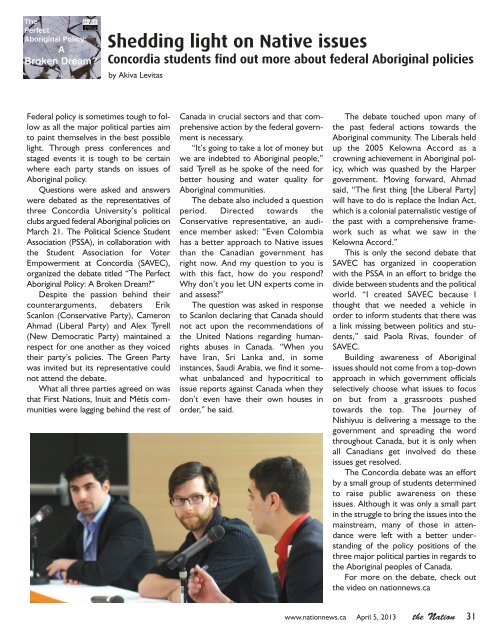Nation-20-11
Nation-20-11
Nation-20-11
You also want an ePaper? Increase the reach of your titles
YUMPU automatically turns print PDFs into web optimized ePapers that Google loves.
Federal policy is sometimes tough to follow<br />
as all the major political parties aim<br />
to paint themselves in the best possible<br />
light. Through press conferences and<br />
staged events it is tough to be certain<br />
where each party stands on issues of<br />
Aboriginal policy.<br />
Questions were asked and answers<br />
were debated as the representatives of<br />
three Concordia University’s political<br />
clubs argued federal Aboriginal policies on<br />
March 21. The Political Science Student<br />
Association (PSSA), in collaboration with<br />
the Student Association for Voter<br />
Empowerment at Concordia (SAVEC),<br />
organized the debate titled “The Perfect<br />
Aboriginal Policy: A Broken Dream?”<br />
Despite the passion behind their<br />
counterarguments, debaters Erik<br />
Scanlon (Conservative Party), Cameron<br />
Ahmad (Liberal Party) and Alex Tyrell<br />
(New Democratic Party) maintained a<br />
respect for one another as they voiced<br />
their party’s policies. The Green Party<br />
was invited but its representative could<br />
not attend the debate.<br />
What all three parties agreed on was<br />
that First <strong>Nation</strong>s, Inuit and Métis communities<br />
were lagging behind the rest of<br />
Shedding light on Native issues<br />
Concordia students find out more about federal Aboriginal policies<br />
by Akiva Levitas<br />
Canada in crucial sectors and that comprehensive<br />
action by the federal government<br />
is necessary.<br />
“It’s going to take a lot of money but<br />
we are indebted to Aboriginal people,”<br />
said Tyrell as he spoke of the need for<br />
better housing and water quality for<br />
Aboriginal communities.<br />
The debate also included a question<br />
period. Directed towards the<br />
Conservative representative, an audience<br />
member asked: “Even Colombia<br />
has a better approach to Native issues<br />
than the Canadian government has<br />
right now. And my question to you is<br />
with this fact, how do you respond?<br />
Why don’t you let UN experts come in<br />
and assess?”<br />
The question was asked in response<br />
to Scanlon declaring that Canada should<br />
not act upon the recommendations of<br />
the United <strong>Nation</strong>s regarding humanrights<br />
abuses in Canada. “When you<br />
have Iran, Sri Lanka and, in some<br />
instances, Saudi Arabia, we find it somewhat<br />
unbalanced and hypocritical to<br />
issue reports against Canada when they<br />
don’t even have their own houses in<br />
order,” he said.<br />
The debate touched upon many of<br />
the past federal actions towards the<br />
Aboriginal community. The Liberals held<br />
up the <strong>20</strong>05 Kelowna Accord as a<br />
crowning achievement in Aboriginal policy,<br />
which was quashed by the Harper<br />
government. Moving forward, Ahmad<br />
said, “The first thing [the Liberal Party]<br />
will have to do is replace the Indian Act,<br />
which is a colonial paternalistic vestige of<br />
the past with a comprehensive framework<br />
such as what we saw in the<br />
Kelowna Accord.”<br />
This is only the second debate that<br />
SAVEC has organized in cooperation<br />
with the PSSA in an effort to bridge the<br />
divide between students and the political<br />
world. “I created SAVEC because I<br />
thought that we needed a vehicle in<br />
order to inform students that there was<br />
a link missing between politics and students,”<br />
said Paola Rivas, founder of<br />
SAVEC.<br />
Building awareness of Aboriginal<br />
issues should not come from a top-down<br />
approach in which government officials<br />
selectively choose what issues to focus<br />
on but from a grassroots pushed<br />
towards the top. The Journey of<br />
Nishiyuu is delivering a message to the<br />
government and spreading the word<br />
throughout Canada, but it is only when<br />
all Canadians get involved do these<br />
issues get resolved.<br />
The Concordia debate was an effort<br />
by a small group of students determined<br />
to raise public awareness on these<br />
issues. Although it was only a small part<br />
in the struggle to bring the issues into the<br />
mainstream, many of those in attendance<br />
were left with a better understanding<br />
of the policy positions of the<br />
three major political parties in regards to<br />
the Aboriginal peoples of Canada.<br />
For more on the debate, check out<br />
the video on nationnews.ca<br />
www.nationnews.ca April 5, <strong>20</strong>13 the <strong>Nation</strong> 31


